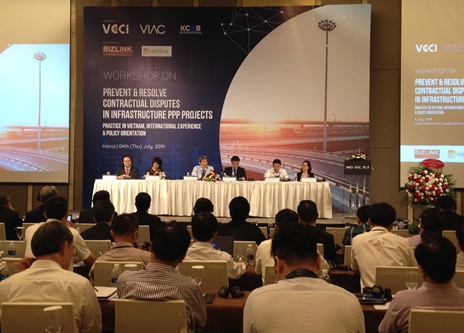Arbitrators need to step-in and deal with disputes in public-private-partnership (PPP) projects so economic development will not be disrupted, experts have warned.

Arbitrators need to step-in and deal with disputes in public-private-partnership (PPP) projects so economic development will not be disrupted, experts have warned.
Viet Nam has developed significantly in recent years with high economic growth rate, increased export and the improvement of foreign direct investment (FDI).
This has driven the demand for energy and infrastructure developments.
Experts say it is important to encourage the private sector to take part in such projects due to the limit of the State budget.
According to vice chairman of the Vietnam Chamber of Commerce and Industry Hoang Quang Phong, PPP projects have been being implemented to lure more private capital.
As of January 2019, 336 PPP project agreements were signed with the total capital raised reaching VND1.6 quadrillion (US$68.8 billion). The figure consisted of 140 build-operation-transfer (BOT) projects and 188 build-transfer (BT) projects.
Do Trong Hai, director of the law firm Bizlink, said disagreements and conflicts might arise between government agencies, investors and people when carrying out a PPP project.
“Disputes must be resolved shortly so that they don’t escalate, assuring the PPP project is carried out quickly and has no negative impact on the nation’s general business environment,” Hai told a two-day seminar that took place in both Ha Noi and HCM City on July 4-5.
Stakeholders should bring the case to the arbitrator as this is an effective way to deal with conflicts, Phan Trong Dat, deputy general secretary of the Vietnam International Arbitration Centre, told the conference.
“Arbitration is secure, flexible, less time-consuming and cost-saving,” Dat said.
“Experiences in developed countries have proven arbitration can lessen the tensions in PPP projects. Therefore, cases may not be brought to the court.”
Professor Pham Duy Nghia at Fullbright Viet Nam University said attracting private investment was good for infrastructure development.
“However, PPP projects often have long life cycles, so risks will come along,” he said, adding risks were related to legal framework, finance, tax and management.
“Risks increase spending on projects. It may not only result in losses for stakeholders but also create disputes, leading to the delay, or even worse, the cancellation of the projects.”
In order to limit the risks, there are two solutions, according to Nghia. One is to forecast potential risks when stakeholders prepare mutual contracts.
A PPP project often lasts for 20-30 years. During the period, the regulations and policies could change so there must be appropriate measures to make sure stakeholders would not suffer, Nghia said.
"The second solution is selecting arbitrators to resolve disputes," he added. “If investors are unaware of the administrative procedures, it may prolong the implementation plan and create more risks for both private investors and State agencies.” — VNS





